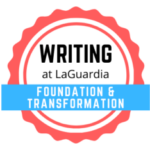
Course Description
3 credits; 3 hours
This course will focus on the role of writing in engineering, mathematics, and computer science. Topics will include practical formats within technical writing, expository writing on scientific and technological subjects, and other compositional and rhetorical strategies that develop and improve students’ abilities in effective written communication. Students will produce a range of documents meant to demonstrate effective verbal and visual technical writing characteristics.
Prerequisite: Mathematics Proficiency and ENA/ENG101
Pathways Student Learning Objectives: Fulfills Pathways Required Core
Course Learning Objectives (Specific to LaGuardia):
- Reinforce the practice of writing as a process that involves pre-writing, drafting, revising, editing, proofreading, critiquing, and reflection.
- Reinforce students’ skill in writing clearly, coherently, and concisely in general academic formats (summaries, response papers, and research-oriented reports) and technical writing genres (memos, letters, infographics, and professional reports) with an emphasis on writing as a critical thinking process. Written documents will vary in length between 200 and 1500 words, using standard written English (SWE).
- Familiarize students with written communication practices within engineering, technical, and scientific-oriented professions.
- Enable students to determine and adhere to the purpose for writing, allowing them to formulate and clearly articulate a stance.
- Enable students to become attentive to the target reading audience so they can effectively determine and utilize appropriate formats and rhetorical strategies to accommodate audience expectations for genre conventions as well as need for information.
- Foster students’ attentiveness to their own linguistic differences and practices and those of their target audiences to practice clear and culturally responsible communication.
- Reinforce students’ information literacy skills by reiterating and providing opportunities to conduct effective research practices involving library databases and online sources.
- Reinforce students’ ability to evaluate and synthesize research sources and integrate them effectively into written documents while employing the conventions of ethical attribution and citation and avoiding plagiarism.
- Foster students’ global learning by allowing them opportunities to advance their knowledge about global issues and consider opportunities for ethical engagement as global citizens and future professionals within engineering, technical, and scientific fields.
Program Learning Objectives
**This is informational as these 2 objectives are embedded in the Course Learning Objectives. These do not need to appear on syllabi. These objectives are assessed annually by the WPAs and Composition Committee and shared with the Assessment Leadership Team.**
PLO 1: Evaluate and synthesize sources using summary and/or paraphrase and/or quotation.
PLO 2: Engage critically and analytically with a text’s major assumptions and assertions.
Course Resources
Faculty-Facing Introduction To Sheet–About Teaching This Course
Student-Facing Introduction To Sheet–About Teaching This Course
OER Resources
See the Open Educational Resources developed for teaching ENG 259.


